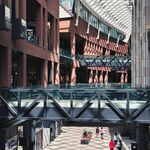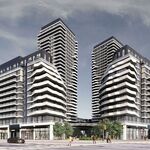Chuck
Senior Member
Vaughan and Markham's population density, though similar, is planned differently. Although both are building an equal number of condos, Vaughan's tend to be in dreadful locations such as Jane and Rutherford, and will contribute as much to its car culture as a lower density subdivision. Markham's up and coming high density areas tend to be along transit friendly streets such as Yonge, Steeles, and Highway 7, and actually have a chance to fix things.
Markham's condos will help to de-suburbanize the area and reduce car dependence. Vaughan's condos only add fuel to the fire - if people are going to use cars anyway, the last thing you want to do is cram more people into the same area, causing even more gridlock. The best thing for the GTA would be to cease development in Vaughan altogether, be it high, medium, or low density housing, or a subway extension past Steeles.
Markham's condos will help to de-suburbanize the area and reduce car dependence. Vaughan's condos only add fuel to the fire - if people are going to use cars anyway, the last thing you want to do is cram more people into the same area, causing even more gridlock. The best thing for the GTA would be to cease development in Vaughan altogether, be it high, medium, or low density housing, or a subway extension past Steeles.




